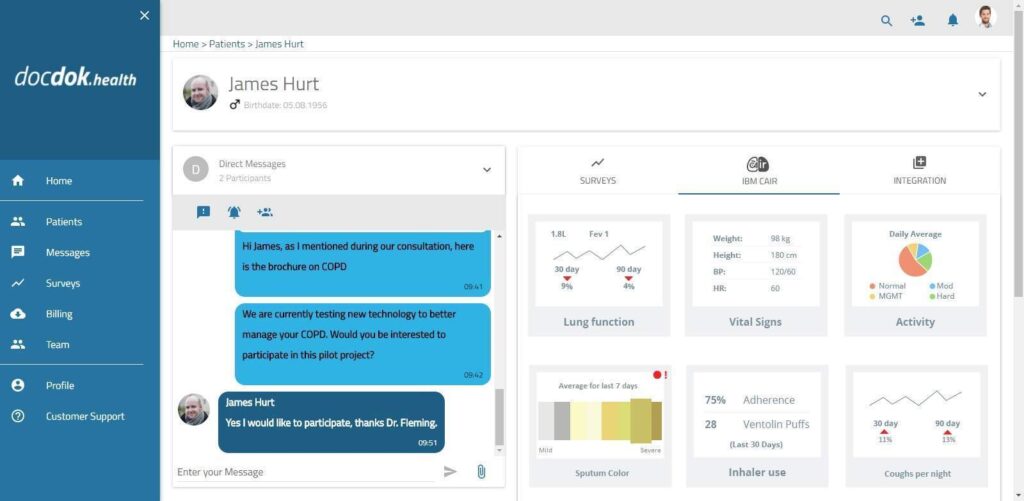
Chronic obstructive pulmonary disease, or COPD, might not be a disease you hear about regularly but it soon will be.
The chronic lung disease, caused by smoking and noxious particles in air pollution, is set to be the third leading cause of death worldwide by 2030, according to the World Health Organisation (WHO).
As well, the Centres for Disease Control and Prevention (CDC) predicts that the expected cost of medical care for adults with COPD will be more than $90bn by 2020.
In particular, it is expected to disproportionately affect countries like China and the UK, which both suffer from bad air pollution.
Despite the severity of the condition, there is currently no cure and doctors do not yet know how to reverse the lung damage caused by the disease.
However, a collaborative project between IBM Research and a new health startup, dockdok.health, is developing technologies to help patients and doctors manage the disease.
How well do you really know your competitors?
Access the most comprehensive Company Profiles on the market, powered by GlobalData. Save hours of research. Gain competitive edge.

Thank you!
Your download email will arrive shortly
Not ready to buy yet? Download a free sample
We are confident about the unique quality of our Company Profiles. However, we want you to make the most beneficial decision for your business, so we offer a free sample that you can download by submitting the below form
By GlobalDataThe project also hopes to bring down the costs of managing the disease, to ensure it doesn’t place a burden on health care providers and insurers.
CAir
A new research project between IBM and docdok.health, named CAir, is going to begin clinical trials next year in Zurich.
In Switzerland alone, it is thought there are around 400,000 cases of COPD, making it a good place to start the trial.
Ulrich Muehlner, the chief executive of docdok.health who has a background in healthcare for the likes of Novartis and Boston Consulting Group, presented the CAir project during a talk at IBM’s Zurich Lab.
He said:
As most chronic diseases progress outside the hospital we need a secure way to monitor patients when they are discharged. In CAir, we are demonstrating that mobile health technologies have the potential to not only offer frequent patient support at scale and low cost, but also to provide health care that is tailored specifically to individual patient needs.
Mobile health technologies
Helping patients to manage conditions using mobile technology is crucial to the vision IBM and docdok.health have put forward for the new trial. At the moment, there are several health apps on the App Store or Google Play Store but they’re fragmented and not necessarily user-friendly for physicians.
Docdok.health has created a cloud-based platform for both doctors and patients to access and interact, to aid in the treatment of the disease.
During the CAir trial, participants will wear Internet of Things (IoT) devices, developed by health tech companies including Biovotion, Footbot, and Nuovair. The wearables can record symptoms such as cough intensity, lung function and heart rate.
This data will then be accessed by doctors using docdok.health’s platform, so they check on their patients’ vitals. This will make it easier for doctors to get objective information from patients.
Thomas Brunschwiler, a researcher at IBM Research and part of the team working on the project, explained how it is often difficult for physicians to get this kind of information – during appointments, patients may not remember how much they cough or lie about how accurately they follow a program of care.
The CAir program aims to rectify these issues through the integration of wearables and software.

What impact will this work have?
At the end of the study, docdock.health will analyse the data collected using IBM’s artificial intelligence (AI) software, to detect patterns and correlations.
In the future, this will be used to identify the status of the design and predict events, such as when a patient might suffer a so-called exacerbation, which can cause them to nearly suffocate and require hospitalisation.
Dr Christian Clarenback, a physician at University Hospital Zurich, said that this will help doctors inform care to prevent events such as this.
We want to challenge the traditional physician office visits and encourage self-care by providing easy-to-use technologies. We must be able to detect pre-acute conditions before the patient clinically decompensates and ends up in the emergency room.
For Muehlner, the work has broader implications for the future of healthcare.
Healthcare is becoming more data-driven and you need to have the patient much more empowered, [in order to] play a more central role in the healthcare ecosystem.
As well, it aims to allow doctors to focus more on patient interaction, instead of the routine work. Throughout the CAir trail, participating doctors will fill out surveys to see if the platform is saving time or adding to their workload.
Ultimately, Muehlner said that healthcare should be more patient-centric. He sees platforms like docdok.health as a way to achieve that.
There will always be a need for human interaction, but physicians should be enabled to do this, through technology and the routine work could be taken over by machines.
When will doctors be using this technology?
It will take a while for technological solutions like docdok.health to trickle down into GP surgeries across the world. Indeed, the startup is only about four weeks old. However, Muehlner is optimistic. He referenced that the US Food and Drug Administration (FDA) has created a dedicated digital health unit.
He said:
The FDA’s digital group [shows] they are open to receiving different technology to assess them from a security and efficacy point of view. The regulators are moving in our direction.
IBM’s work, particular its supercomputer Watson, has been making waves in the healthcare space.
The AI is already being used to assists cancer diagnosis or identify genes that cause ALS, so using it to help manage COPD is the next step in the company’s healthcare plans.






